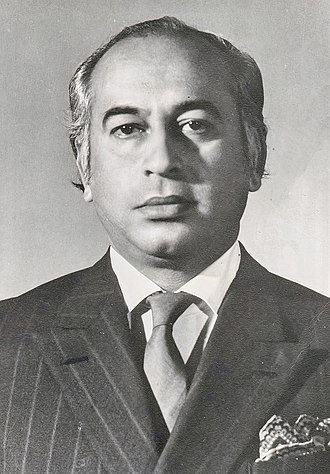Zulfikar Ali Bhutto
Zulfikar Ali Bhutto in Urdu ذوالفقار علی بھٹو ( Larkana , 5 of January of 1928 - Rawalpindi jail, 4 of April of 1979 ) was a politician of Pakistan. Leader of the Pakistan People's Party ( Pakistan People's Party - PPP), Bhutto was president of Pakistan between 1971 and 1973 and prime minister between 1973 and 1977 . He was the father of the former Pakistani prime minister Benazir Bhutto.
|
Biography edit
Ali Bhutto assumed the presidency of Pakistan in 1971 , shortly after the country's defeat in the Third Indo-Pakistani War . Since taking office, Bhutto has embarked on a vast nationalization program , mainly in the grassroots industry , and an ambitious land reform project . All banks were nationalized in January 1974 . The military was removed from political decision-making positions, but the portion of the budget for national defense was increased to 6% of GDP. Nevertheless, Bhutto's initiatives generated discontent, especially among businesspeople, resentful of nationalizations, and among Islamic religious , who rejected the socialist- oriented policy .
In 1972 , the Pakistani intelligence service discovered that India was close to developing a nuclear bomb . In reaction, Bhutto formed a group of engineers for the purpose of doing the same. In 1973 , with the adoption of a new constitution , of federalist court , the powers of the State were transferred to the prime minister , for whose position the National Assembly elected Bhutto. In 1974 , after the successful Indian nuclear test, Bhutto promised that Pakistan would have his bomb.
During the Bhutto government, a serious uprising in Balochistan was suppressed with the presumed aid of the Shah of Persia , fearful that the rebellion would contaminate the Iranian province of Sistan-Baluchestan .
In the 1977 general elections - the second general election in Pakistan's history - nine opposition parties allied themselves against the PPP. The result, however, favored Bhutto's party, which elected 150 deputies in a 200-seat assembly. The opposition violently contested the results, which would have been marked, he claimed, by fraud and coercion. Then demonstrations and disturbances broke out in the country. Faced with this situation, General Muhammad Zia-ul-Haq decided to impose martial law in Pakistan on July 5 , 1977, and removed Ali Bhutto from the post of prime minister.
Ali Bhutto was arrested, tried and sentenced to death on the gallows, for the alleged murder of the father of a PPP dissident. On April 4, 1979, he was executed to bid farewell to Pakistani political life at the age of 51.
